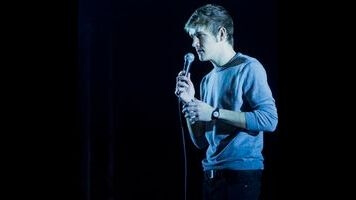Bo Burnham combines anxiety and absurdity to brilliant effect on Make Happy

When Bo Burnham came to prominence, he was a wild ball of energy and creativity with his wordy, fast-paced songs and bits. With sharp wit, an incredible lack for lyrics, and the charm of a teenage heartthrob, his Shakespeare meets “Weird Al” meets Justin Bieber mashup was a shock to the system. But as talented as Burnham was, the one problem with his act was that he often came off a bit too precious and cute. While he was incredibly talented for his age—he began posting songs to YouTube at age 16, and released his first comedy special, Words Words Words four years later—the worst moments were the moments where you remembered that he was basically a teenager.
Still, it was obvious that he had a ton of potential, and with his latest special Make Happy, he has realized that potential, dropping the cutesy stuff while maintaining the stunning talent that made him so intriguing in the first place. Continuing the trend of his 2013 album What., he gets more avant-garde and considerably darker than he ever got as a teen, resulting in one of the best stand-up specials of the year.
Right from the beginning, a darker Bo Burnham emerges; he wakes up in makeup resembling Heath Ledger’s Joker, and as he walks to the stage, we hear a monotone female voice warning the audience not to laugh at this special because “the world is not funny.” This is justified with factoids like “12 percent of the world does not have access to clean drinking water” and “Guy Fieri owns two functioning restaurants.” With that dark introduction, Burnham takes the stage, having already stacked the deck against himself.
It’s not remotely a problem, as Burnham is hilarious from the beginning. The opening bit is a funny take on the call-and-response cliché, as Burnham asks the audience to say “Hell yeah!” if they’re a virgin, and “No comment” if they’re a bit too afraid to share their thoughts on the Israel-Palestine conflict. From there, he gives us a song called “Straight White Man,” in which he sings about the (minor) problems that come with being privileged. This runs the risk of becoming a bit stale—hasn’t Ben Folds already covered this territory? But when Burnham asks us to “walk a mile in his Uggs,” it’s hard not to crack a smile.
Throughout the special, Burnham deconstructs tired clichés of modern music. First, he adroitly comments on hip-hop that focuses more on killer beats than insightful lyrics (think Future), by dropping a beat that would make Mike Will Made It jealous, and proceeding to rap children’s songs over it. For hip-hop fans who have been thrilled by a song’s dynamic beat only to be underwhelmed by its trite lyrics, this bit should hit close to home.
Rap is hardly the only genre Burnham skewers, however, as he also targets the conventions of modern bro-country. He expertly tackles the paint-by-numbers approach taken by so many country stars while noting the hypocrisy of millionaires in expensive cowboy boots pandering to a working class existence they are completely alienated from. Burnham’s best takedown, however, goes to the most overdone trend in pop music: the inspirational pop song. Tracks like Katy Perry’s “Roar” and Sara Bareilles’ “Brave,” which offer false hope in the form of bland sloganeering, get taken to task with a song whose chorus encourages people to kill themselves. Burnham is quick to explain to the audience that he doesn’t really mean it, but he also makes it quite clear that if you search for answers in the Top 40 playlist, you’re looking in the wrong place.
The comedy world also gets brought to size here: Burnham is harsh on Lip Sync Battle, as he correctly points out that every episode of the show, without fail, features either a man lip-syncing a song by a woman, or a rich, young white actress lip-syncing to a hip-hop song. The “humor” is obvious and wears quite thin. Burnham doesn’t spare himself either, as he often critiques his own material. Just when you think a rant about the size of Pringles cans being too small is going on too long, he points out that the bit is going on too long. Whether it’s comedy or music, Burnham is always taking things apart, deconstructing the formulas in our favorite songs and bits, and showing us how they’re made. This could threaten to turn cynical, but his observations are astute, performed with remarkable passion and candor.
While Burnham’s personality is often light and jovial, he occasionally takes an adversarial tone with his audience. Early in the show, when a female fan yells “I love you!” he shouts back “No, you fucking don’t!” Everyone laughs, but there’s some truth to his remark; Burnham is only there to entertain. His fans might admire his work and think he’s handsome, but ultimately, they don’t really love him. And as he points out, they shouldn’t. In what is perhaps the most honest line of the special, Burnham notes he’s “in the service industry,” and that he’s just overpaid.
The central thesis of Make Happy is that all entertainment—good or bad—is ultimately fleeting, and exists to momentarily provide us with a bit of joy and relief from our stressful lives before we resume the struggle. Even if Burnham’s act is more worthy than Lip Sync Battle, he still has the same goal: to distract us from the harsh realities of the modern world, be they famine, death, or the continued prosperity of Guy Fieri. While this observation is accurate, it does nothing to detract from the quality of Make Happy. Burnham is a skilled comic and his combination of rapid-fire songwriting and meaty observations about modern life are captivating. After displaying serious potential early in his career, Burnham has grown up, and the results are stunning.